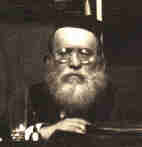 |
Hadrash Ve-Haiyunby the Reisha Rav, HaGoan Rav Aaron Levine Tz"lElucidated and Adapted by Efraim Levine |
 |
Hadrash Ve-Haiyunby the Reisha Rav, HaGoan Rav Aaron Levine Tz"lElucidated and Adapted by Efraim Levine |
Tetzaveh
Dedicated in Honor of
Nechama and Esther Levine
of Beit Shemesh Yerushulayim
To Dedicate Please Contact Hadrash Ve-Haiyun
Into the Choshen of Judgment shall you place the Urim and the Tumim and they shall be upon Aharon's heart when he comes before Hashem; and Aaron shall bear the judgment of the children of Yisroel upon his heart before Hashem constantly. (Shemos 28:30)
The choshen that Aharon and the succeeding kohanim hagidolim wore symbolized judgment as the posuk itself describes the choshen as the choshen of Judgment. One explanation for the connection between the Choshen and judgment is that when the sanhedrin who specialized in judgment could not decide on a question they would seek the Judgment of Hashem through the Urim and Tumin that rested within the choshen.
With regard to judgment we are obligated to follow the letter of the law and not be swayed by our feelings or emotions. The posuk clearly conveys this message with the command not to favor the poor in judgment. (Shemos 23:3)
This idea is revisited in this posuk. The posuk states that Aharon should wear the choshen that symbolized the highest form of judgment upon his heart. The simple interpretation of the word upon is a description of the physical location where the choshen should rest. However we may also interpret the word upon as meaning above i.e., a higher authority. The message conveyed is that in judgment the intellect should be above the heart i.e., emotions. Feelings or emotions of the heart should not sway the judgment.
With this interpretation we may take a new look at a posuk and a gemarah. The posuk (Shemos 4:14, 27) relates that when Aharon was informed that Moshe would take over as leader of the Jewish people he rejoiced in his heart. The gemarah (Shabbos 139a) relates that this was a great merit for Aharon since he was older than Moshe, just as qualified and presently was serving in that capacity. For Aharon to step down and hand over the reins of leadership to Moshe was itself noteworthy, but to rejoice at the appointment of his younger brother was truly extraordinary. This display of warmth bespeaks volumes of the fine character of Aharon. The gemarah goes further to inform us that because Aharon rejoiced in his heart, he merited wearing the choshen upon his heart.
The simple interpretation is that he was rewarded measure for measure. Because he performed well with his heart, his heart was rewarded as being the carrier of the prized possession of the kohen gadal. However, based upon the idea presented above let us take a new look at this gemarah.
When Hashem told Aharon that Moshe would assume the role of the leader of the Jewish people this did not sit well with his intellect. After all, Aharon was older and equally qualified, yet because he realized that this was the will of Hashem he forced his intellect to humble itself and even forced his heart to rejoice with the good Hashem had done for Moshe. In this case Aharon caused his intellect to suffer at the hands of his emotions since this was the will of Hashem. In this merit Hashem rewarded him with the choshen which symbolized the opposite i.e., the humbling of the heart to the intellect. The power for one to control his emotions is a gift that few are able to attain. Thus, it emerges that in reward for his good reaction to his brother's appointment, Hashem did not reward him just measure for measure but with a greater measure.
There is a powerful message here. First we must note that one of the most difficult tasks we face in life is not to begrudge and accept with joy the blessing that is bestowed upon others even though we don't understand why they deserve it. Second, we must also note that many times our intellect is fully aware that our actions are completely wrong and contrary to halacha but unfortunately our emotions and drives are so strong that the intellect is powerless in controlling us. It may seem at first glance that the above two are unrelated. However, we learn from this gemarah that they are strongly connected. If we were only to behave like Aharon and force our intellect to yield to our emotions i.e., rejoice someone else's blessing even when we don't understand, then in this merit we will also come to carry the choshen above our hearts, i.e. achieve mastery over our emotions where our emotions will be humbled to our intellect and allow our intellect to prevent us from wrongdoing.